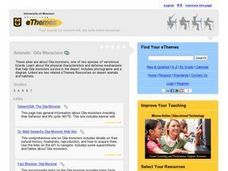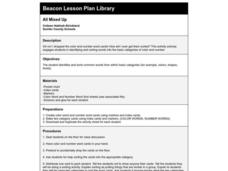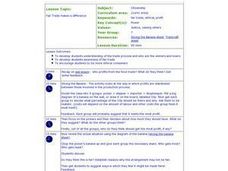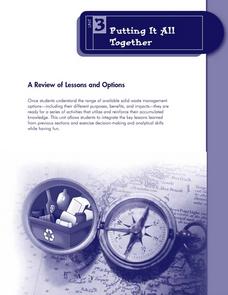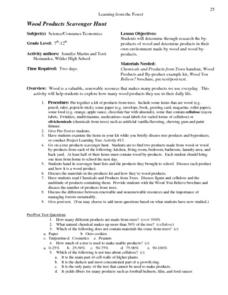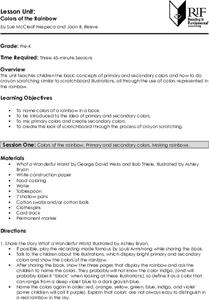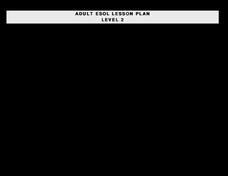Curated OER
The Me Book
Students relate to the pictures as symbols so that they come to point to named pictures, explain what pictured objects are for, match pictures to real objects, categorize objects, and recognize words.
Curated OER
Safety Lesson
Learners review or introduce personal safety concepts in a variety of areas common to the lives of students.
Curated OER
The Controversial Thanksgiving
Twelfth graders construct their own presentations on Thanksgivings, and then give group presentations on their Thanksgiving celebration with each group member participating in giving a certain aspect of their culture's or family's way of...
Curated OER
How is a Human Vacation Like an Animal Migration?
Students compare animal migrations with human vacations. They consider the preparations involved, the purposes of travel and the consequences of any mistakes.
Curated OER
Little Me in a Big World: Ants
First graders predict, observe and record strategies to overcome them using discussions, role play, and charts. Over a three or four day period, they examine obstacles that humans and insects encounter.
Curated OER
Animals: Gila Monsters
Students research sites about Gila monsters. They explore the physical characteristics and defense mechanisms that help Gila monsters survive in the desert. Includes photographs and a diagram.
Curated OER
Who Were the First Americans?
Second graders explore Native Americans through a PowerPoint presentation.
Curated OER
All Mixed Up
Students identify and sort words into the basic categories of color and number. After a lecture/demo, students utilize a worksheet imbedded in this plan to gain practice sorting number words.
Curated OER
Wanted: Water!
Students determine what percentage of the Earth is water and how much water is needed by humans.
Curated OER
LESSON 3: The Many Shades of Our World
Students recognize that people have many different types of skin color.
Curated OER
Fair Trade Makes a Difference
Seventh graders see how profits are distributed among people by slicing a banana. In groups, they role-play who gains the largest profit.
Curated OER
A Review of Lessons and Options
Students participate in a number of activities that reinforce the knowledge they have learned from previous units over waste management.
Curated OER
Wood Products Scavenger Hunt
Young scholars investigate the by-products of wood and explore the wood products in their own environment. Products containing both cellulose and silvichemicals obtained from the trees are examined in this lesson.
Curated OER
Create a Soil Aggregate
Learners simulate the conditions which occur in a soil aggregate. They explain how IPM affects the environment. They identify the cast of characteristics to develop their aggregate.
Curated OER
Colors of the Rainbow
Pupils explore primary and secondary colors through the use of colors represented in the rainbow. They read and discuss the book, 'What a Wonderful World,' mix paint colors and paint rainbows, and create scratchboard paintings.
Curated OER
La Influencia Latina en Nuestra Comunidad (The Latino Influence in our Community)
Learners visit a grocery store to create a list of Latino products. They take photographs of areas in their community that demonstrate the latino population. Students research community services available to the Latino population. They...
Curated OER
Hiragana - Perfect ~ Writing a Japanese Pictionary
Students listen to a story and view Japanese artifacts. They use the internet to explore the writings known as Hiragana. They create their own Japanese pictionaries and share them with the class.
Curated OER
Where Should We Land?
Students discuss the difference between major landforms as a class. In groups, they rate the landforms based on the needs of the community that wish to settle there. They also discuss the push and pull factors of the colonists that made...
Curated OER
Vegetarianism
Students classify ways to stick on a vegetarian diet. Students survey the reasons why others make it or fail on these types of diets. Students aim to improve their understanding of vegetarianism.
Curated OER
ESOL Safety and Security
Students review a list of vocabulary words needed in emergency procedures at home and work. They discuss safety procedures for each work emergency; choking, Heart Attack, and Chemical burn.
Curated OER
Explore! Fun with Science
Pupils explore the challenges of living in space by designing a facility that can provide everything required to support humans and can protect them from the harsh environment of space.
Curated OER
USA Quilt and Cookbook Project
Students share information about themselves and their surrounding area through postcards, quilt squares, and recipes. Students use a digital camera to take pictures of their community and create postcards using desktop publishing. They...
Curated OER
Living vs. Non-Living Things
Fourth graders describe the characteristics that determine if something is living, dead, or non-living. They determine the difference between living and non-living things. Students determine if an object is living or non-living and...
Curated OER
Cell-ebrations in Science
Students recognize that all living things are made up of cell and that they cannot easily be seen by the naked eye. Students become familiar with the use of microscopes as a tool for investigation.
Other popular searches
- Reading Food Labels
- Reading Nutrition Labels
- Nutrition Food Labels
- Interpreting Food Labels
- Read Food Labels
- Food Labels for Nutrition
- Examples of Nutrition Labels
- Meat Food Labels
- Fill Out Food Labels
- Fast Food Nutrition Labels
- Nutrition Facts Pie Graph
- Calculating Food Labels







